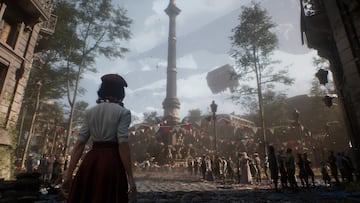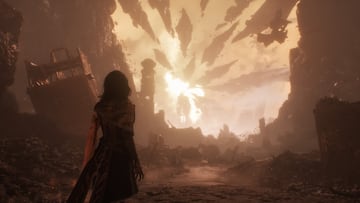Sandfall Interactive
Clair Obscur: Expedition 33: about the GOTY “of course we think about it... but this is not what we made it for”
We chat with Guillaume Broche, CEO of Sandfall Interactive and Lorien Testard, composer of the soundtrack.

Clair Obscur: Expedition 33 is shaping up to be a GOTY title. Behind its development is a passionate team that shaped it by setting aside multiple taboos and conventions during the creative process.
This week, we had the opportunity to chat with Guillaume Broche, the CEO of Sandfall Interactive, and Lorien Testard, the composer of the soundtrack. In their own words, they shared some key details about the development process and the composition of the music. The interview is below.
A world that looks like a living painting
Meristation: The game uses painting beyond the core concept of the story to include the tonality and colors used in certain scenes, combat, cinematics, and the entire world. Is this intentional? With so much detail, do you think most players will notice this?
Guillaume Broche: Yes. The game was intentionally designed to look like a painting because the way you see it is important. If you replace a game or even a tree, for example, you will see that everything feels cohesive because everything is designed around the painting: the environments, color palettes, post-processing effects, and visual effects.
So everything has to feel like a painting, but not too much. It’s just a subtle hint. That’s how we ended up with this art style that’s... yeah, it feels like it could be a better painting. So it’s not really just mixing realism with painting; it’s more like surrealistic paintings.
Renoir as a symbolic inspiration
Meristation: Regarding Renoir’s presence in the game, we believe it is inspired by the artist Pierre-Auguste Renoir. Where did this idea come from, and why was the Impressionist painter chosen as a key element of the game’s development?
Guillaume Broche: For us, it was important to reference paintings in many different ways throughout the game rather than naming them, especially since naming is very important. When we were looking for a name for this character, it felt natural to borrow one from a painter who might have lived in this era.
We were inspired by him, not only in terms of his artistic style but also in terms of his painting style. It was simply a reference to that, and as we are French, it was important for us to focus on French art history during this period and the role of a well-known figure at that time.

Red and white roses: beauty and tragedy
Meristation: In the music videos and lyrics, there are strong references to red and white roses. What do these colors symbolize?
Guillaume Broche: There are different meanings that we hope players will discover. We won’t reveal too much for now, but when we discussed how to depict a noble death in the game, we knew we wanted something tragic, dark, and beautiful.
We wanted to create a contrast between the beauty of what was happening and the darkness of the event. We imagined a beautiful flower that was just disappearing—a wilted flower. That’s how we came up with the idea of people disappearing. We implemented this idea throughout the game to remind players of the phenomenon driving the expedition.
That’s how it came about. Since the colors of the flowers are important, for now, I prefer to let the players figure it out.
Music as a character
Meristation: Speaking of the music, what inspired the lyrics of the theme song?
Lorien Testard: The lyrics are closely tied to the main story of the game. We wanted them to introduce the plot and the feeling we want to share with the players. I wrote the lyrics to tell a story that players will understand at the end of the game, not the beginning.
Meristation: Music is a kind of companion; it has its own life. It’s like another character within the game. How do you achieve that as a composer? Could you also tell us if you or the team has planned concerts of this music around the world?
Lorien Testard: A concert would be like a dream for me and the team. So we will work on it. We don’t have anything to announce now, but yes, it’s something we want. But give us some time to do it right and to be ready, like we want.
As for the music, we want it to tell the story on its own. It’s a bit of a leap, but I think it’s possible. I really love the characters and the story, and I feel very involved in the game world. When you feel that emotion, you share the characters’ feelings in the songs. With this tonality, I believe you can write music that enhances the story and changes the world.
A combat system with identity
Meristation: What was the creation process for the gameplay?
Guillaume Broche: From the beginning, the direction of the gameplay was clear, especially in battles. Basically, I created this project as a kind of assignment because something suitable was missing from this RPG, which hadn’t been seen since ‘Lost Odyssey.’
I mean, it’s more of a Japanese style of gameplay. That’s how the project started. As I developed the battle system and played my turn-based title, I wondered what else I could do in my game.
I could play, take care of my own details, and choose the type of parry I wanted. So, at first, I tried to implement that. It was super fun, and it completely changed the battle system. Since then, I think that’s one of the reasons we were able to release it—it’s so good that we never changed direction.

So, it’s pretty much the same, with some minor tweaks, of course. The basis was a battle system with real-time mechanics. One of the key things we held on to was this system, which allowed us to finish the game with few problems. It was important to us because if you’re good at blocking and dodging, you can finish the game with just one player.
After that, a lot of work went into the realization of the battles, camera movements, animations, and slow motion. Everything was done to make the game feel really good.
It also has effects that make constipation very clear and make the system feel unique. Of course, you can see the influence of the different games I worked on in the battle system.
The game of the year?
Meristation: How does it feel to be competing for the best in several categories, including best game of the year?
Guillaume Broche: For us, it’s not a goal. It’s more of a bonus, but it’s not why we make video games. What’s more important to us is getting 13 tons of messages from people telling us how beautiful the game is. We also get personal messages from people saying, ‘I was going through something difficult in my life, and this game helped me.’ We receive a lot of beautiful, personal messages that touch us deeply. We get really excited about that because it’s why we make video games. That’s why we wrote such an emotionally intense story. We put everything we had into this story and this world.
For us, it’s enough to know that we touch some people in such a profound way. That’s why we created the game. It’s basically a win for us. The same goes for Game of the Year and all that. Of course, we think about it... but this is not what we made it for. It’s just a bonus for us.

Meristation: What about you, Lorien? I’m sure you’re also competing for the best soundtrack.
Lorien Testard: I feel the same way. I’m happy when players come back to enjoy the game. So, for us, it’s already a win. I’m very happy to share this with the players. Yes, the game is fun. If we get it, we’ll feel like we’ve gotten everything we wanted from the players.
Follow MeriStation USA on X (formerly known as Twitter). Your video game and entertainment website for all the news, updates, and breaking news from the world of video games, movies, series, manga, and anime. Previews, reviews, interviews, trailers, gameplay, podcasts and more! Follow us now!


